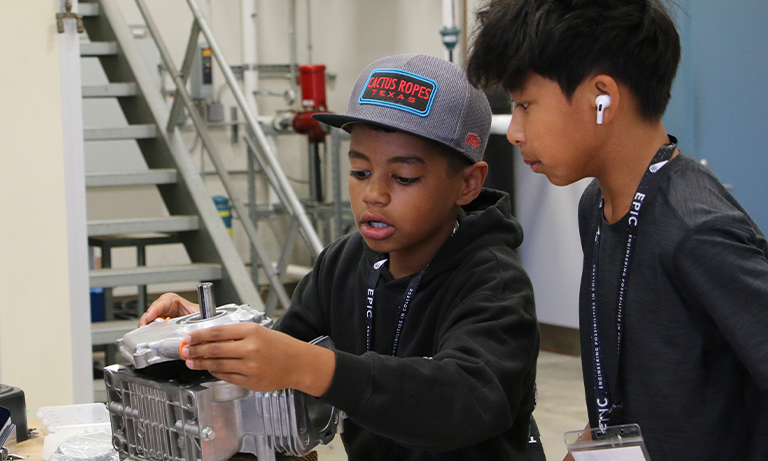With feedback from a Swiss hairdresser, members of a new Cal Poly club are helping protect small businesses in Switzerland from cyber threats.
The club, CS + Social Good (CSSG), was created as an outlet for tech-savvy students to give back to communities both local and afar.
“I joined CS + Social Good because the club allowed me to use the skills I have learned in the classroom and apply them in a way to help others,” said Greg Bisbjerg, a computer science and chemistry major. “I feel this is the best way for me to give back to the surrounding community in a way others might not be able to.”
CSSG has been creating a website to make mental health resources more accessible to Cal Poly students. But last year, a faculty member contacted them about a possible project abroad.
Alex Dekhtyar, a professor in the Computer Science & Software Engineering Department, has been involved with the annual IEEE International Requirements Engineering Conference, where researchers, practitioners and educators meet to discuss trends and issues related to requirements engineering – the process of defining what goals a software project shall achieve. Together with several other academics, Dekhtyar co-founded RE Cares, a co-located event, which seeks to use computer skills to do good things in the communities where the conferences are held.
“We have the privilege of being in high tech,” he said. However, he added, “Often times the software products we build are for people who have the ability to pay.”
RE Cares was created to help society by adopting the latest software engineering research and practice and applying them to important societal problems. In the first year, when the Requirements Engineering conference was held in Canada, conference attendees helped create communications software for first responders. The next year, they helped create software for wheelchair users to access public transportation on a South Korean tourist island.

Those first two projects involved few students. But, as the third conference approached, Dekhtyar approached department chair Chris Lupo about the possibility of involving students. And Lupo suggested the CSSG club.
Initially, students from the club were going to travel to Switzerland.
“Unfortunately, that didn’t happen,” Dekhtyar said, noting that the COVID-19 pandemic ceased foreign travel opportunities. “What happened afterward, I think, was even more impressive.”
In their search for a theme for RE Cares 2020, Dekhtyar and other organizers of the event reached out to a Swiss academic who noted that much commerce there and in surrounding countries entail small businesses that aren’t well equipped for cybersecurity.
“These businesses do not have IT personnel,” Dekhtyar said. “Very often they don’t have IT consultants. But they all are becoming a part of the online economy.”
The remote project was launched and named Security Processes, Issues and Knowledge for small Enterprises (SPIKE), and a Swiss hairdresser agreed to provide input about how she conducts her online efforts.
“Overall, our goal in creating SPIKE is to help microenterprises learn to protect themselves from security threats,” said Michelle Jakab, the CSSG president, who co-led SPIKE with Bisbjerg. “The hairdresser we interviewed helped us understand the perspective of our target audience: Swiss small business owners.”
To help with building the software that targets cybersecurity awareness, RE Cares organizers approached a group of security researchers, including Cal Poly’s newest cybersecurity faculty member, Dr. Dongfeng (Phoenix) Fang. With Fang’s help, the group identified important topics that small business owners need to be educated on and created the educational content.
After a series of RE sessions and a hackathon, the SPIKE project worked to develop an initial software design and prototype a few features of it with the hairdresser.
“It was nice to receive feedback from the perspective of a customer, allowing us to see how well we were able to address the needs of a customer with our project idea in such a short period of time,” Bisbjerg said.
The team, which worked with students from University of Kentucky – where another main event organizer works — had a working demo at the end of the conference that exceeded expectations. And they continued to work on it afterward.
Both Jakab, a software engineering student, and Bisbjerg acquired leadership and development skills. And they were able to use software for good.
“I think it’s a good teaching moment,” Dekhtyar said.
Next year, RE Cares will seek to help a nonprofit in South Bend, Indiana, the site of the next conference. Dekhtyar hopes to line up students for that project around March.
While Cal Poly computer science and software engineering students are known to experience excellent career placement, often with high paying jobs, Dekhytar said it’s important for them to harness their skills for philanthropic causes as well.
“This is not a requirement for them in term of job placement,” he said. “They don’t need this. But they are good people. They should want this.”


